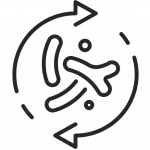Cold pump on lips? Tips for a carefree summer

After a well-spent holiday, we often get an unpleasant surprise – the skin is red, a cold sore is already starting to form on the lip, it feels like the first stage of the manifestations of the herpes virus. Why it happens and what to do, we will tell you in this article.
We tend to call the manifestations of the herpes virus that hit us during the winter as colds, but how can this virus become active in the summer? Turns out, just like cold, fluctuating temperatures, sunlight is a proven trigger for the herpes virus.
The main causes of cold sores
Cold sores are caused by the herpes virus, which is found in almost 99% of people. Once in the human body, it never leaves it and for some people it never becomes active. Others have one or more cold sores at least once a season, which is not unusual. If, however, herpes appears almost every month, this may indicate a weakened immune system. Since the cold sore is an infection caused by a virus, its activation is largely influenced by a person’s immunity. A weak immune system without cold sores can also signal other skin problems, such as the formation of abscesses at the slightest injury, growths and the appearance of an allergic reaction.
Exposure to sunlight and UV radiation may cause skin burns. This is probably the most common reason why people who are prone to cold sores suffer from an outbreak of this disease right in the summer.
- Chapped lips. Sun exposure can cause dryness and damage to the lips. Cold viruses can become more active in damaged areas of the skin.
- Stress and fatigue . Lazy summer days are all about relaxation and relaxation, but planning summer trips, including finances, can add stress and trigger a viral flare-up;
- Food with a high acid level . In summer, we tend to eat more of such foods, such as oranges, pineapples and salads with vinegar dressings;
- Sun lotions and creams. Sunscreen lotions are fine and dandy, but they can clog pores, making the skin more oily, which in turn increases the likelihood of a herpes outbreak.
What to do? Some tips to prevent cold sores and herpes virus in summer
- Allow enough time for rest and drink enough fluids – you should drink at least 6-8 glasses of water a day.
- Protect your lips , for example, by using Larifan products for lip care. For example, replace your daily lip balm with Larifan lip balm to protect them from sun exposure, moisturize to avoid microcracks. The patented component of natural origin, dsRNA Larifan, included in its composition, adds additional value to the balm, as it improves the regulation of natural local defenses, thereby protecting against the effects of harmful external environmental factors (including viruses, bacteria). Consequently, the risk of herpes virus activation under provoking conditions is reduced.
- Improve immunity. Consume vitamin C, which is found naturally in foods such as strawberries, kiwi, broccoli and tomatoes.
- Ice can also be used. Ice can help reduce swelling and redness caused by sunburn. Then apply a moisturizing balm.
Larifan and herpes virus
Larifan are products created in Latvia using unique biotechnology. They contain a patented, natural dsRNA (double-helical ribonucleic acid) that activates the body’s natural defenses and protects against various harmful external environmental factors, especially against the entry and development of viruses and microbes in the body.
Larifan is used to avoid diseases, including herpes virus and respiratory viruses.











